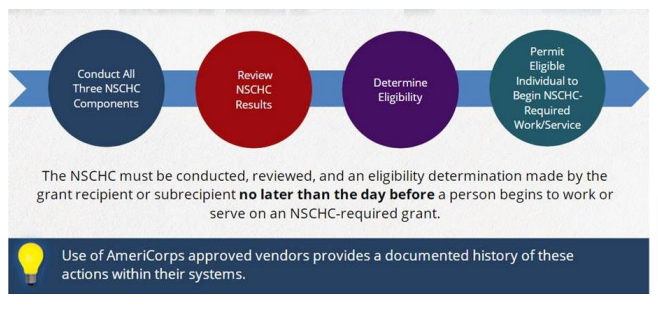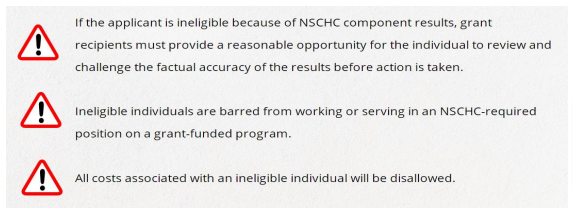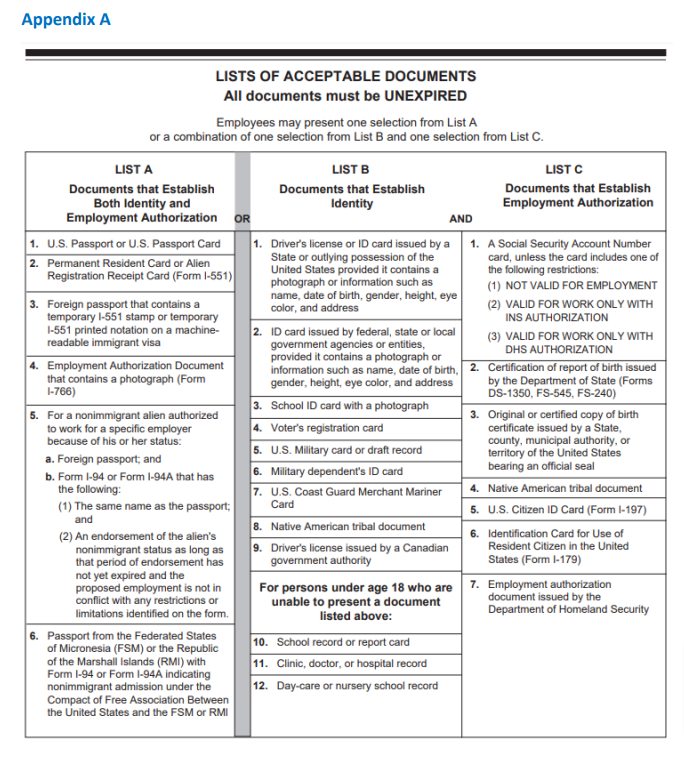Guidance: National Service Criminal
History Check (NSCHC) Procedures
The NSCHC requirements are mandated by Congress in the Serve America Act and National and Community Service Act. They protect the most vulnerable and mitigate the risk of unintended harm coming to those who benefit from AmeriCorps programs. AmeriCorps Grantees and Subgrantees are legally required to maintain compliance. The standard enforcement action for noncompliance with the NSCHC requirements is cost disallowance.
Do the right checks.
Do checks at the right time.
Document your activities.
- AmeriCorps State and National grantees/subgrantees must conduct National Service Criminal History Checks for all AmeriCorps applicants ages 18+. Funded programs must conduct NSCHC on AmeriCorps staff as well.
- AmeriCorps recommends using their approved vendors to conduct the National Service Criminal History Checks. These vendors are Truescreen and Fieldprint. Detail on how to utilize these vendors can be found on their NSCHC resource page and in this Manual. AmeriCorps selected these specific vendors to help ensure NSCHC compliance.
- Please become familiar with the NSCHC requirement. Failure to conduct timely and compliant National Service Criminal History Checks may delay enrollment and can also result in sometimes significant cost disallowances to your program.

Reference: § 2540.204
What are the components of a National Service Criminal History Check?
- (a) Unless CNCS approves a waiver under § 2540.207, for each individual in a position specified in § 2540.201, grantees or subgrantees must, obtain:
(1) A nationwide check of the National Sex Offender Public website through NSOPW.gov;
(2) A check of the State criminal history record repository or agency-designated alternative for the individual’s State of residence and State of service; and
(3) A fingerprint-based check of the FBI criminal history record database through the State criminal history record repository or agency-approved vendor. - (b) One way for grant recipients or subrecipients to obtain and document the required components of the National Service History Check is through the use of agency-approved vendors.
§ 2540.205
By when must the National Service Criminal History Check be completed?
(a) The National Service Criminal History Check must be conducted, reviewed, and an eligibility determination made by the grant recipient or subrecipient based on the results of the National Service Criminal History Check before a person begins to work or serve in a position specified in § 2540.201(a). This means prior to completing enrollment process in eGrants Portal.
(b) If a person serves consecutive terms of service or employment with the same organization in a position specified in § 2540.201(a) and does not have a break in service or employment longer than 180 days, then no additional National Service Criminal History Check is required, as long as the original check complied with the requirements of § 2540.204.
If a National Service Criminal History Check was not conducted on a person because they were under the age of 18 at the time, they began their prior term(s) of service or employment in a covered position, pursuant to § 2540.201
(b), a National Service Criminal History check must be conducted prior to the individual beginning a subsequent term of work or service for which the person is 18 years of age or older at the start of work or service.
(c) Persons working or serving in positions specified in § 2540.201(a) prior to May 1, 2021, who continue working or serving in a position specified in § 2540.201(a) on or after November 1, 2021, must have a National Service Criminal History Check conducted, reviewed, and an eligibility determination made by the grant recipient or subrecipient based on the results of the National Service Criminal History Check completed in accordance with this part. For these people, the National Service Criminal History Check must be completed no later than November 1, 2021.
Develop a culture where abuse is discussed, address and prevented
1. Screening and selecting employees and volunteers
2. Guidelines on interactions between individuals
3. Monitoring behavior
4. Ensuring safe environments
5. Responding to inappropriate behavior, breaches in policy, and allegations and suspicions of abuse
6. Training about abuse prevention
Overcoming challenges
Beliefs that hinder abuse prevention
- Abuse couldn’t happen in my organization
- Offenders are monsters-not my staff, volunteers, etc.
- If we focus on abuse then it must happen here
Structural issues that hinder prevention - Poor employee/volunteer retention
- Limited/inadequate resources (no time, money, personnel, expertise)
- Difficult to adopt abuse prevention policies and procedures
Documentation required
- NSCHC Policies and Procedures
- Written consent to conduct State/FBI checks
- Individual understands selection is subject to NSCHC results
- Verify individual’s identity through government issued photo ID
- Proof results were reviewed by staff
- Results of NSCHC components in member’s file (or access to Truescreen for state checks)
- Approved ASP (if applicable)
NSCHC Policies & Procedures
- Describes how Subgrantee will address all NSCHC requirements including the AmeriCorps approved sources to be used for conducting NSCHC and practices for documenting adherence to NSCHC eligibility determination and timing requirements.
- Identifies staff member position(s) with responsibility for the NSCHC process and how Subgrantee ensures compliance with completion of the annual AmeriCorps eCourse training.
- Describes practices for protecting information related to NSCHC. Subgrantees must take reasonable steps to protect the confidentiality of any information relating to the criminal history checks, consistent with authorization provided by the applicant.
- Describes adopted procedures for informing individuals of their rights related to NSCHC and how the results will be used by the program.
- If Subgrantee has multiple sites, describe the process of monitoring NSCHC for those sites.
- Describes how notice is provided to an individual that selection into the program is contingent upon the Subgrantee’s review of the individual’s NSCHC component.
- Describes how the program complies with the requirement to provide a reasonable opportunity for the individual to review and challenge the factual accuracy of the result before action is taken to exclude the candidate from the position.
Required Evidence of NSCHC Components
- All required components (NSOPW, state(s), and FBI checks) were completed and on file.
- All required components were conducted on time.
- Documentation reflects evidence of when and by whom the checks were reviewed.
- AmeriCorps approved vendors maintain these components for programs and provide a process to review the results in their systems.
Who may NOT serve?
- Pre-Check –any individual who refuses to undergo the NSCHC or makes a false statement about information provided for their NSCHC.
- Post Check Convictions – Sex Offense (anyone listed or required to be listed on a sex offender registry Murder – anyone convicted of murder as defined and described in 18 U.S.C, § 111 is ineligible
Who Must Have National Service Criminal History Checks?
All covered position checks must include all three components:
- Nationwide National Sex Offender Public Website (NSOPW) – prior to considering individual for position
- Statewide check* and fingerprint-based FBI check
- NSCHC is not required for individuals who are under the age of 18 on the first day of work or service However, if they enroll into a subsequent term and are 18 at time of enrollment, then the full CHC must be conducted before enrollment as with any other member.
* State of Service and State of Residence required if different. State of Residence is where the candidate is living at time of application to the Corps.
Suspended Members – are still considered enrolled therefore Subgrantee does not have to conduct new criminal history checks upon reinstatement after 180 days.
Timing of the NSCHC
NSOPW
- completed before an individual is considered for service in any AmeriCorps program (this includes orientation hours)
- This can be done through NSOPW.gov or Truescreen, the AmeriCorps approved vendor
State/FBI – when and where to run checks
- As of May 1, 2021 – All three checks must be conducted, reviewed, and an eligibility determination made by the grant recipient or subrecipient before an individual is fully enrolled in eGrants and begins to work or serve on an NSCHC-required grant.
- State checks: AmeriCorps identified state repository or AmeriCorps approved vendor Truescreen
- FBI fingerprint checks: AmeriCorps identified state repository or AmeriCorps approved vendor Fieldprint
Consent and Disclosure Form – Consent form must be signed by individual (prospective member or staff) BEFORE state and FBI checks are conducted. Note: Truescreen has their own online consent
Permission from individual is required to conduct State and FBI checks and share results. It also stipulates that the individual understands that the findings determine if they are employed as Corps staff or eligible to serve as an AmeriCorps member in the program. Remember, each Subgrantee must have a policy on what are acceptable findings and individuals must be informed that AmeriCorps participation is based on findings. If findings are not in line with AmeriCorps requirements and Corps Policies, then the individual is not eligible to serve. Consent and Disclosure form is in the Manual
First and Last Names
- Subgrantees must maintain evidence that the first and last name used on name-based checks reflect the current name of the individual.
- Documents used to determine the first and last name must be consistent with sources described in the programs written Policies and Procedures.
Name-based Checks
AmeriCorps expects that Subgrantee staff will undertake reasonable due diligence to determine the current first and last name to conduct name-based checks. It is prudent, but not required, to check any other names that the person has used or is/was known by.
Use of the first name and last name reflected on the following sources is acceptable:
- First and last name reflected on a signed Employee’s Withholding Certificate W-4 form
- First and last name reflected on a signed USCIS Employment Eligibility Verification I-9 form (see Appendix A on last page of this document)
- First and last name reflected on any document on the USCIS Form 1-9’s List of acceptable documents
- First and last name reflected on benefit or income documentation from SSA, including but not limited to Social Security Benefit statement, SSA-1099, Supplemental Security Income (SSI) documentation, Social Security Disability Insurance (SSDI)documentation
If the individual provides Subgrantees with documents that reflect different names, staff should obtain additional information from the individual to determine the first and last name of the applicant that will obtain the most accurate criminal history records. The process to reconcile documentation reflecting different names to determine the first and last name to be used on a name-based check should be recorded in the grant recipients’ policies and procedures and any additional documentation should be maintained as grant records.
Documentation of Eligibility
- Documentation that the eligible and selected candidate is eligible to serve/work despite an AmeriCorps approved vendor check returns a “do not recommend” results for the candidate.
- AmeriCorps approved vendors, Truescreen and Fieldprint, facilitate this process for you.
- Evidence of eligibility determination includes documentation of the actions taken by the Subgrantee and consider additional information about the candidate.
Confidentiality
Sub grantee must take reasonable steps to protect confidentiality of any information relating to the criminal history check, consistent with authorization provided by the applicant.
NSCHC Grant Costs
Applicants may not be charged for the cost of any component of the criminal history check.
https://americorps.gov/sites/default/files/document/2022_01_26_NSCHC_Using_AmeriCorps_Approved_V
endors_Fieldprint_Truescreen_OM.pdf
Using AmeriCorps Approved Vendors Truescreen and Fieldprint Manual
Fieldprint Quick Facts
- Applicants for Fieldprint checks schedule appointments and AmeriCorps grantee’s create accounts here: www.fieldprintcncs.com. Also learn about the process and read FAQs at www.fieldprintcncs.com
- After creating an account, grantees access the client portal to view results and adjudicate checks here: https://reports.myfieldprint.com
- Cost: $28.75
- Fieldprint Customer Service: Please note there are two separate customer service contacts.
1. Account Management Team: for grantee administrative and account-related assistance. (Applicants should not contact the account management customer service; they should use the applicant call center contact below.) Phone: 888-472-8918 x 2440 Email: customerservice@myfieldprint.com
2. Applicant Call Center: for assistance with scheduling and appointments. Monday through Friday 8 a.m. to 10 p.m. ET Phone: 877-614-4364 customerservice@fieldprint.com - Average Turnaround Time to obtain Adjudication Recommendation: 48 hours or 2 business days from the Livescan fingerprinting date. Note that turnaround times for ink fingerprinting will be longer due to mail processing time.
Using Truescreen
All recipients may use Truescreen to obtain NSOPW and/or State checks on individuals in covered positions. Recipients should refer to the pre-approved NSCHC waiver Use of Truescreen for NSOPW and/or State Checks before ordering checks.
Truescreen Quick Facts:
- Sign up here: https://applicationstation.truescreen.com
o Use agreement code: CNCSAgreement - Order checks, access results, etc. here: https://mytruescreen.com
- Cost: See https://americorps.gov/grantees-sponsors/history-check for price list for all states.
o NSOPW: $7.50
o State: $19.50 + State Pass-through Fees (if applicable) - Truescreen Customer Service: Monday through Friday, 3 a.m. to 10 p.m. ET
Phone: 888-291-1369 ext. 0 Phone: 888-291-1369 ext. 2006 CNCShelp@truescreen.com Average Turnaround Time to obtain Adjudication Recommendation: 1-5 business days, see https://americorps.gov/grantees-sponsors/history-check for turnaround times for all states.
Using NSOPW and State Repositories for NSOPW, State and FBI Checks Manual https://americorps.gov/sites/default/files/document/2022_04_01_NSCHCUsingNSOPWandStateRepositori es_OM.pdf
NSOPW – public registry, does not need consent –
must be run BEFORE the individual is CONSIDERED for a position as staff or member
Conducting a NSOPW Checks
NSOPW.gov
- Go to NSOPW.gov and enter first and last name as shown on government issued photo ID – generally driver’s license or passport
- Ensure check is complete – all states/territories reporting – – All states and territories noted as “searched”
- If all are “not available”, the search must be conducted again until all states have been checked
- If the nationwide search cannot verify the unavailable state(s) then you may run a statewide search Search results must be printed out with the search date printed date on the page (dated through printing, not handwritten)*
- Staff must sign/date the search results to document they have reviewed and verified everything
- If there are any “hits”, check each one and annotate each as to why it is not the individual in question i.e. name different, date of birth different, etc., initial each annotation and keep in staff/member’s file
- The applicant may NOT be considered until all the above are confirmed – – search fully completed
- If you realize the something wasn’t checked and the member already started a day or two before, you cannot change the member’s start date to accommodate this error, that is considered fraud
- Maintain results in individual’s file
* – Click on each entry to learn more about the individual to determine if it matches your candidate (photo, age, gender, place of residence)
- Check off each “hit” on your printed copy
- Annotate and initial each result – how you can tell it’s not your applicant
Truescreen
- Order check (select NSOPW) and double enter first and last name as shown on government-issued photo ID
- Review adjudication recommendation and make final adjudication decision in the Truescreen system. You will receive an email reminder.
- Truescreen will maintain results for up to seven (7) years.
Use of Truescreen for NSOPW and/or State Checks
Grantees who use Truescreen must:
- Set up a Truescreen account with CNCS/AmeriCorps agreement code
- Complete Truescreen checks before the start of work/service (adjudicated by grant recipient) Truescreen does not provide information for the following states/territories: California, Delaware, Louisiana, Massachusetts, Mississippi, Nevada, New Hampshire, New Mexico, Virginia, Guam, N. Mariana Islands, Puerto Rico (as of Aug 2022)
Grantees using Truescreen will not be required to get a check from an unavailable state/territory for individuals in a covered position (all AmeriCorps members/staff in TCN grants) if they have:
- Obtained an NSOPW check from Truescreen
- Obtained any required state checks that are available from Truescreen and conducted a finger print based FBI check
Conducting a State Check
State Repository
- Identify the source for state checks. They must come from official from AmeriCorps-designated sources ONLY Visit: https://www.nationalservice.gov/resources/criminal-history-check/StateCheckGuidance
- Follow the State’s process to order and pay for checks
- Review results and document adjudication
- Maintain results in the individual’s file
General Information on State Checks
- While there are two options for types of state checks – – name-based and fingerprint-based, only one type of state check is required. AmeriCorps does not recommend one of these checks over the other. Either the name-based state check or the fingerprint-based state check is acceptable.
- To be in compliance with AmeriCorps requirements, recipients may have to conduct checks in up to two states: state of service/work check as well as a state of residence check (i.e. if the state of residence is different from the state of service/work at the time of application).
Truescreen
- From drop down menu) by double entering the first and last name as shown on government-issued photo ID
- Review adjudication recommendation and make final adjudication decision in the Truescreen system. You will receive an email reminder
- Truescreen will maintain results for up to seven (7) years
Conducting an FBI Check
If a State Repository provides FBI checks, you may request that be run when you request the state check(s). Although Fieldprint is the preferred vendor. Example here is from the California State Repository.
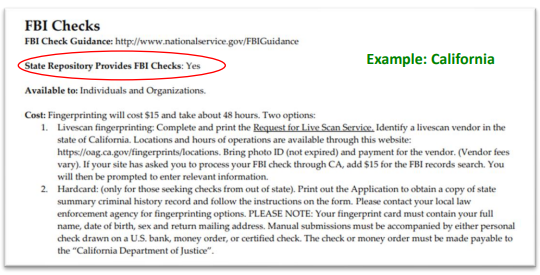
State Repository
- Identify the source for FBI checks through the state. They must come from official from AmeriCorps – designated sources ONLY Visit: https://www.nationalservice.gov/resources/criminal- history-check/StateCheckGuidance
- Follow the State’s process to order and pay for checks
- Review results and document adjudication
- Maintain results in the individual’s file
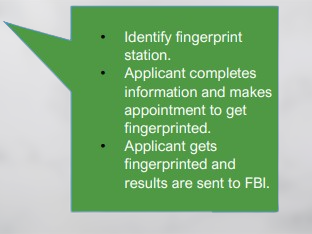
Fieldprint
- Follow Fieldprint process to order check
- Provide your Fieldprint code to applicant
- Applicant completed information and makes appointment to go to Livescan location
- Applicant gets fingerprinted and results are sent to FBI
- You are notified when results are ready for your review in account
- Review results in Fieldprint and document review of results
- Fieldprint will maintain results for up to three (3) years.
A special note about Fieldprint Fingerprint Cards
Grant recipients who are more than 35 miles from a Fieldprint Livescan location can receive fingerprint cards. Fieldprint paper fingerprint cards are coded to specific individuals with a barcode during the setup process.
- × Do not duplicate fingerprint cards.
- × Do not tamper with the barcode.
- × Do not use any fingerprint card other than the card provided by Fieldprint.
- × Do not fingerprint other individuals on the card coded for a specific individual – only place the fingerprints of individual for whom the card was provided on the individual’s card.

Duplicating, tampering, providing non-Fieldprint fingerprint cards, or submitting fingerprints for the wrong individual will result in Fieldprint shredding the card and an FBI check will not be conducted. In these cases, applicant must begin the process again.
National Fingerprint File (NFF) Pre-Approved Alternative Search Procedure
Effective May 1, 2021: The National Fingerprint File (NFF) is an electronic information sharing system maintained by the Federal Bureau of Investigation (FBI). The NFF allows the FBI and the States to exchange criminal history records for noncriminal justice purposes authorized by federal or state law, such as background checks for governmental licensing and employment.
States that participate in the NFF respond to record requests for all authorized noncriminal justice purposes and, as such, the FBI ceases to maintain duplicate criminal history data for these states. When a state participates in the NFF system, an FBI fingerprint check is duplicative of the search of a state’s criminal history record repository. An FBI fingerprint check eliminates the need for grantees to conduct duplicative state criminal history record checks in states that participate in the NFF system.
Therefore:
- If a required state check is from a state that participates in the NFF, then the grantee does not need to conduct the check in that NFF state if they have conducted a fingerprint-based FBI check.
- If a required state check is from a state that does not participate in the NFF, then this pre-approved Waiver is not applicable, and the grantee must obtain the appropriate NSCHC state check(s).
The following states participate in the NFF program. States beginning participation in NFF after May 1, 2021, are listed with their effective date. NSCHC’s for those states conducted on or after the effective date listed may apply this waiver.
| Connecticut as of (7/25/21) | Colorado | Florida | Georgia | Hawaii |
| Idaho | Iowa | Kansas | Maryland | Michigan (9/15/21) |
| Minnesota | Missouri | Montana | North Carolina | New Jersey |
| New York | Ohio | Oklahoma | Oregon | Tennessee |
| Utah (4/13/2022) | Vermont (6/16/21) | West Virginia | Wyoming |
Example 1: One state participates in NFF
An individual who is required to comply with NSCHC will serve in Maine (state of service does not participate in NFF) and resides in Colorado at time of application (state of residence does participate in the NFF). The grantee must conduct an NSOPW check, a fingerprint-based FBI check, and a Maine state criminal history check. The grantee does not need a separate state of residence criminal history check from Colorado. The Colorado criminal history record information is included in the fingerprint-based FBI check.
Example 2: Both states participate in the NFF
An individual who is required to comply with NSCHC will serve in Ohio (state of service does participate in NFF) and resides in Iowa at time of application (state of residence does participate in the NFF). The grantee must conduct an NSOPW check and a fingerprint-based FBI check. No separate state checks are required. Ohio and Iowa criminal history record information is already in the fingerprint-based FBI check.
Example 3: No states participate in the NFF
An individual who must comply with NSCHC will serve in Wisconsin (state of service does not participate in NFF) and resides in New Mexico at time of application (state of residence does not participate in the NFF). The grantee must conduct an NSOPW check, a fingerprint-based FBI check, a Wisconsin state criminal history check, and a New Mexico state criminal history check.
Fieldprint FAQs include: https://fieldprintcncs.com/SubPage_FullWidth.aspx?ChannelID=414
- Establishing an account
- Appointments
- Personal Info Required
- Livescan
- Fingerprints rejected or considered illegible
- Obtaining results
- Cleared or Not Cleared results • And more…
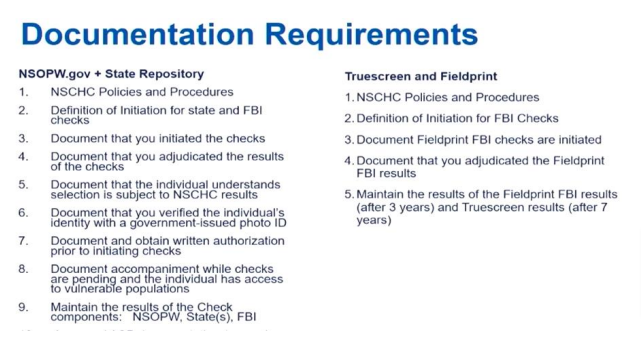
All TCN Subgrantees must complete the AmeriCorps National Service Criminal History Check (NSCHC) eCourse every year.
At least one key staff involved in the CHC process must take this course annually. In “accomplishments” select the Certificates of Completion and email to TCN. At least two staff must take the course.
Litmos home page login or sign up: https://americorpsonlinecourses.litmos.com/account/Login
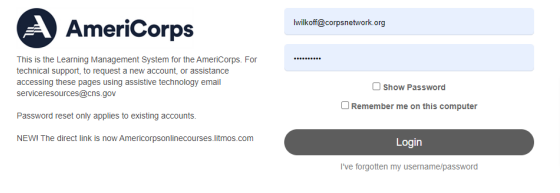
In the Content Library https://americorpsonlinecourses.litmos.com/home/library Check out the two other trainings:
- Check your Check – Ensuring Compliance with Truescreen and Fieldprint
- Monitoring NSCHC in Truescreen and Fieldprint
Break in Service
If a member serves consecutive terms of service with the same organization and has a break in service longer than 180 days, then an additional NSCHC is required. A break in service means that a person is no longer providing service through or receiving salary from a recipient or subrecipient. Temporary interruption of work or service without termination of employment or expiration of the agreement under which service is being provided is not a break in service.
It is not necessary to redo the NSCHC for individuals who serve consecutive terms of service with the same organization if the break less than 180 days and the original NSCHC checks are compliant. However, If the person turns 18 before the start of the subsequent term of service, NSCHC is required prior to the individual beginning a subsequent term of work or service.
It is a best practice to document any break in service and retain that documentation as a grant record. For example, if an AmeriCorps Seniors volunteer who receives a stipend has run out of leave and is on leave without pay, the grant recipient should maintain documentation to show that the person is on leave status rather than terminated from the program.
Changing National Service Programs: When someone leaves one national service grant program and begins serving or working in different grant program, the grant program receiving the employee or participant must conduct a new NSCHC, even if there has been no break in service.
However, if you are a recipient with multiple programs, and a participant moves from one of them to another, you only have to conduct a new NSCHC for that person if they have a break in service that is longer than 180 days.
FAQs – see Manual for full FAQs
3.0 Timing
3.1 Is the recipient program required to conduct a second NSCHC on an applicant who defers service for a year?
Candidates who are selected and have cleared their NSCHC may defer or delay their start of service without undergoing a new NSCHC. Service delay or deferral is permitted for up to one (1) year, but the approved program design must include this option. The agency recommends that programs develop a written policy on how to handle NSCHC for people who defer service.
3.2 Our program receives thousands of applications to serve. Performing NSCHCs on everyone who applies for a position or to serve can be very burdensome and expensive. Is there a better way to manage this workload?
Your program’s NSCHC policy and procedures should identify at which point applicants are checked. However, please note that all checks must be conducted, reviewed, and an eligibility determination made by the grant recipient or subrecipient based on the results of the National Service Criminal History Check before a person begins to work or service
3.4 How far in advance of participation in a recipient program should we conduct the NSCHC?
Recipients may start conducting the NSCHC from the point of application. The regulations require all checks must be conducted, reviewed, and an eligibility determination made by the grant recipient or subrecipient based on the results of the National Service Criminal History Check before a person begins to work or serve.
3.5 What if the results of NSCHC are still pending but the individual is scheduled to start service/work imminently?
The individual may not begin work/service while NSCHC results are still pending. The regulations require all checks must be conducted, reviewed, and an eligibility determination made by the grant recipient or subrecipient based on the results of the National Service Criminal History Check before a person begins to work or service.
Grant recipients may face enforcement remedies, including financial consequences, if grant recipients deviate from the requirements.
3.6 When must I supplement checks?
If an individual is serving a consecutive term and turns 18 before the start of the subsequent term of service, NSCHC must be conducted.
4.0 Eligibility and Suitability
4.1 What does it mean to be required to be listed on a sex offender registry?
In some situations, a person may have been convicted of an offense and ordered by the court to register as a sex offender, but he or she did not register. Since the NSOPW check only identifies people who have registered, programs must also use candidate’s criminal history information to check for any offenses for which the candidate was required to register under state law but did not. Individuals who are required to be listed on sex offender registry are ineligible to serve/work on AmeriCorps grants.
5.0 Budgeting NSCHC
5.1 The cost of conducting an NSCHC can be a financial burden for a recipient. Can AmeriCorps pay for these checks?
Yes. The person who is serving or working in a position that requires NSCHC may not be charged for the cost of any component of a National Service Criminal History Check.
The total cost of conducting NSCHC is an allowable program operating cost (called a “volunteer support expense in AmeriCorps Senior programs) and should be included in the budget. Recipients should project all cost components such as fingerprinting, notarization, mailing, and state repository and FBI fees.
5.2 Are recipients allowed to use current year grant funds to pay NSCHC costs for members who will be enrolled in the next program year? If not, may recipients defer the costs and charge them to the new grant year (as budgeted) even if the expense was incurred prior to the project start date?
NSCHC costs are allowable costs that are not required to be associated with a particular program year. The funds that a recipient has budgeted for checks are not limited to use during a particular period. They can be used to perform checks on any person in a position who needs the NSCHC at that moment in time. The costs are allocable to the recipient at that moment in time because checks are required upon application to serve/work. Waiting for a future budget to start the checks is not an option and incurring the cost today and posting it against a future date would be improper accounting.
5.3 Programs cannot charge an applicant for the cost of conducting the NSCHC. Does this mean that we can’t charge an applicant and later reimburse him or her for this cost?
Programs are permitted to ask a candidate to pay for the check(s), as long as the program reimburses the applicant for the cost of conducting the check(s). The person who is serving or working in the position that requires NSCHC may not be charged for the cost of any component of a National Service Criminal History Check. An organization’s NSCHC policies and procedures should describe the actions required for paying for checks and, if applicable, the actions required to reimburse a candidate for the cost of conducting the checks.
6.0 Documentation
6.1 May we retain only electronic records rather than paper files?
There is no rule requiring criminal history check records to be paper based. You may save scanned images of criminal history check results and the associated documents, rather than paper documents. A program using an electronic record system should make sure that it meets all expectations for verifiable and auditable records. Given the critical nature of the date when the NSCHC was performed and when the individual began work or service, the program should make sure that any record – whether paper or electronic – clearly and without doubt establishes when the checks were performed, by whom, from what sources the information was obtained, and by whom the results were reviewed and considered in selecting the individual. Refer to the NSCHC Manual for additional information on NSCHC documentation requirements.
6.2 How should we store, secure, and file the results of the NSCHC?
Grantees must take reasonable steps to protect the confidentiality of any information relating to the criminal history check, consistent with authorization provided by the applicant. NSCHC information should be maintained in a secure location under the control of an authorized records custodian. Only people who have an official need to review the information should have access to the records. An organization’s NSCHC policies and procedures should describe practices for safeguarding information related to NSCHC.
6.3 Must I store NSCHC records at the service site, or may I centralize the records at our headquarters?
Records (electronic or hard copy) may be stored at any secure location, so long as they are accessible for timely routine use by the recipient, and for oversight and monitoring by AmeriCorps monitoring officials, without undue cost or delay.
One more Q&A asked on an AmeriCorps, the agency webinar 3/9/21:
Q: If Fieldprint results come back as not cleared, what does that mean.
A: They are looking at it from a national perspective so the crime may be a conviction for that offense in one state but not in another state. States may not provide complete results like reporting arrests but not providing conviction data, so it is marked as not cleared. Subgrantees must do a little more investigation into this.
Enforcement of Noncompliance
- AmeriCorps will apply enforcement action related to findings of NSCHC noncompliance identified through oversight and monitoring grant records.
- Annual eCourse training does not change the legal requirements for NSCHC, nor does it prevent AmeriCorps or A*C OIG from pursuing other civil or criminal enforcement or preventive remedies available by law.
Findings Review
During a review or audit by AmeriCorps or TCN, programs will be liable for all non-compliance.


